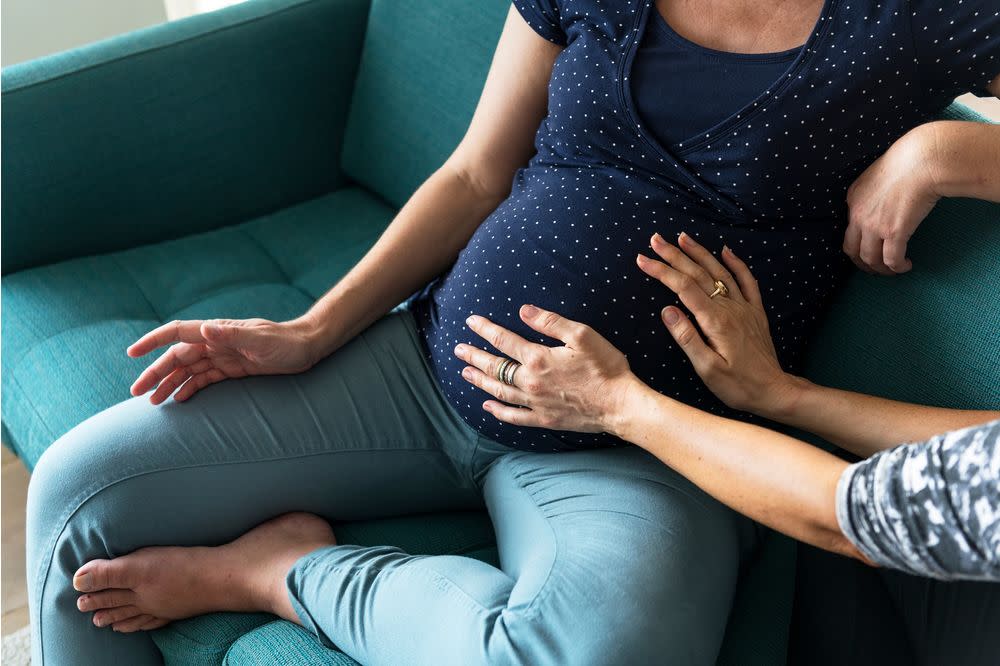Science Finally Confirms That Pregnant Women Need More Personal Space

February 27, 2019
Anyone who's ever been pregnant knows that you feel naturally protective about your growing belly. But amazingly, a new study, currently under peer review, confirms that women in their third trimester have a greater sensitivity to objects nearing them than women in earlier pregnancy or postpartum, reflecting a greater need for more space around them. It's as if science has validated your feelings to keep others far, far away from your pregnant tummy.
Personal space changes in late pregnancy
"My aim was to define the boundaries of what we define 'peripersonal space'—the space surrounding the body—along pregnancy," study author Flavia Cardini, Ph.D., a senior lecturer in psychology at Anglia Ruskin University in the UK, tells Parents.com. She asked blindfolded participants (can you picture this experiment in Bird Box?) to push a button when they felt a tap on their abdomen. "This tap was delivered while a three-second sound was played, and participants had the impression of a sound moving towards them," Dr. Cardini says. "We measured speed in responding to the touch."
Previous studies have shown that the response to touch when a sound is perceived as close is faster than the response when a sound is perceived as further away. Dr. Cardini used that to measure the women's perception of when things got too close for comfort. "We found that in the second trimester when the body hasn't changed much yet, the peripersonal space of pregnant women is not different from that of non-pregnant women," Dr. Cardini says. "However, in the third trimester, the peripersonal space expands significantly." Within two months of giving birth, the peripersonal space comes back to pre-pregnancy size.
The study reveals how the brain's sense of space compensates for a rapidly changing body—one that's carrying very precious cargo. "The changes the body undergoes during pregnancy are very fast and massive," Dr. Cardini says. "The brain might not be able to adapt to them quickly, which might be why it needs to expand the sense of near space in order to better monitoring external threat."
The pregnant belly becomes vulnerable
But beyond this cognitive adaptation, the study affirms the very real risks to the growing abdomen in the third trimester. "It is important to maintain the 'protective bubble' through the late trimester to deflect any harm to the fetus," OBGYN Samira Tahtawi, M.D., OB hospitalist group site director at WakeMed Cary Hospital in North Carolina, tells Parents.com. "The physical protuberance of the term uterus is at risk merely by its extension so far out into the woman's immediate physical environment. Just as we reflexively protect other body parts from harm, so would we protect our abdomen and life within from any perceived harm."
Dr. Cardini says she was initially "puzzled" that this effect wasn't noticeable in her results from women at 20 weeks pregnant. "I suppose our brain is still able to keep track of these minimal changes in navigating the external space and does not need to have an enlarged representation of the near space [yet]," she says.
But Dr. Tahtawi suggests it makes sense that a woman's boundaries only grow as her she gets further along. "A woman knows that her most forward-pointing organ—uterus and baby—is her most vulnerable," she says. "A slip and fall at 36 weeks is fraught with more complications than the same mishap at 18 weeks. Descending a staircase, driving a car, having the dog jump up to greet us, will all be considered more carefully with respect to the potential harm those daily activities may pose for the fetus."
Preventing invasion of personal space
Beyond physical harm, the study validates a woman's emotional need for extra space to accommodate her larger belly. "It's not that women are just being 'overly sensitive,'" Dr. Tahtawi says. "It is notable to have science reaffirm the peripersonal space entity to alert family, coworkers, and friends that advanced gestation with its consequent physical changes does increase the vulnerability factor to the fetus."
And this also means no touching. "Pregnant women need little reminding that their abdomen requires a safety barrier as they reach term," Dr. Tahtawi says. "So women should feel empowered to take whatever action is right for them, including telling people to stop or that they aren't comfortable with being touched, backing up, or even gently pushing the toucher's hands away!" Women can also wear statement T-shirts that remind people to keep their distance. "This can wordlessly prevent the oft-dreaded belly touching," she says.


